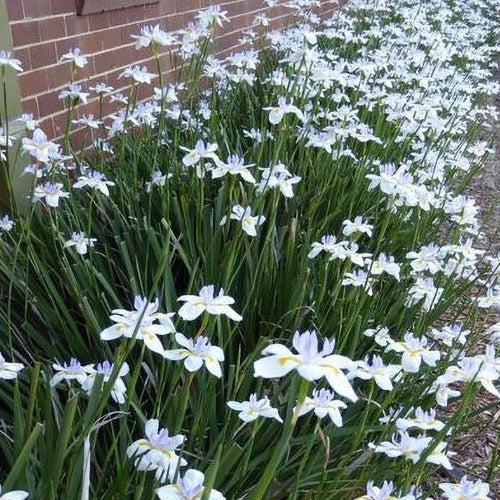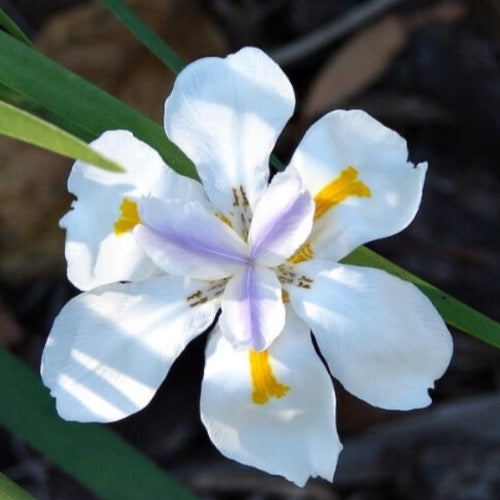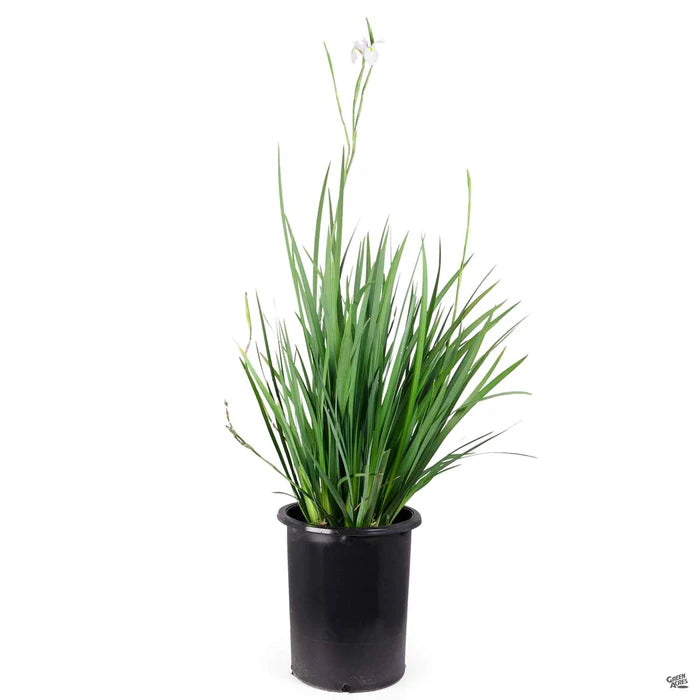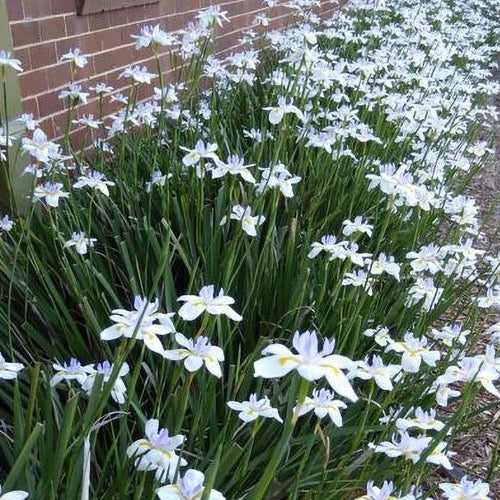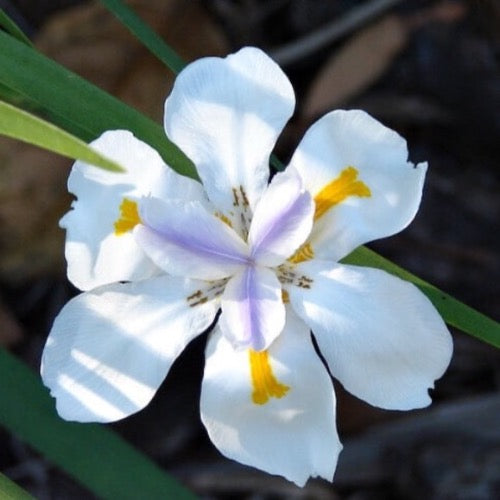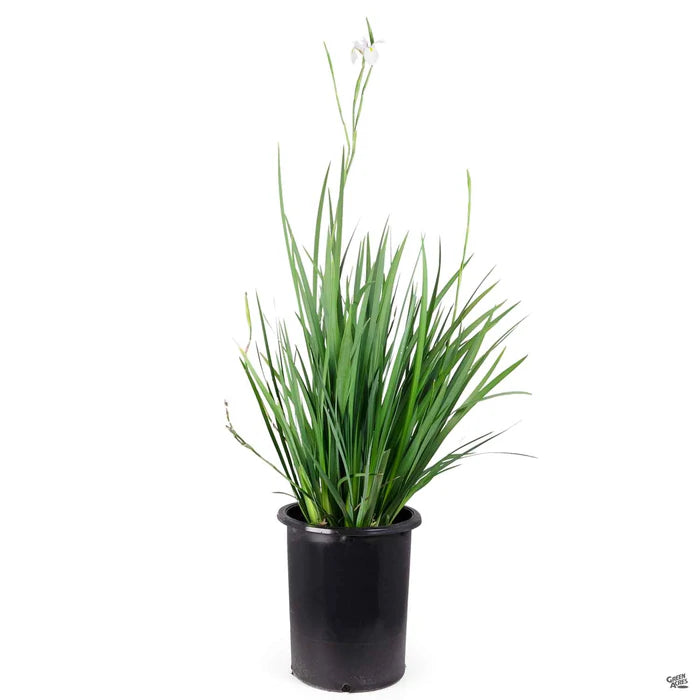
Delivery & Installation
-

Use code DBD and get 10% on entire delivery ONLY orders (1-3 Days)* Discount not Good with Installed orders Minimum order $150
-
$250.00 + FREE delivery & Installation
All orders of $250.00 and more qualify you for FREE delivery & Installation (Hillsborough, Pinellas, Manatee and Pasco Counties ONLY)
Plant It Tampa Bay
African Iris "Butterfly Iris"
Couldn't load pickup availability
African Iris "Butterfly Iris"
African Iris (Dietes vegeta) - also known as "Butterfly Iris" (pictured above) - is probably the best known in South Florida landscapes. Its thin, willowy, upright leaves grow in a clump that forms a grass-like mound about 2-1/2' - 3' tall.
 |
Advantages:
|
 |
Grows Best:Landscape Container House Plant |
 |
Ideal position:Full Sun 6 + Hours best |
|
|
Growth Outlook:Height : 2.5' - 3' Wide: Up To 18" Growth Rate: Slow Plant Spacing: 30" apart |
 |
Pet Friendly - yes
|
Overview
African Iris "Butterfly Iris"
African Iris (Dietes vegeta) - also known as "Butterfly Iris" (pictured above) - is probably the best known in South Florida landscapes. Its thin, willowy, upright leaves grow in a clump that forms a grass-like mound about 2-1/2' - 3' tall.
This plant blooms on and off all year with bright white flowers dabbed with lavender and gold. Another lesser-used variety has small, soft yellow flowers with a purplish-red center.
- Space plants 30 in. plus apart
- Grows well in moist soil
- Flowers throughout spring
- Reaches standard mature height of 3 ft.
- Moderate disease and insect resistance
- Perennial, wet soil tolerant and clumping habit
- Grows in full sun to partial shade
- Ideal for water garden
- Low-maintenance once established
- Water 3 times to 4 times per week for the first growing season
- Winter hardy from USDA zones 8b to 11
- Not guaranteed to be in bloom on arrival
Where To Plant
- Around a landscape boulder
- Accent for a mixed bed
- Along a porch or deck
- Surrounding a palm
- Front of the border (African and Blue Flag)
- Lining a walk
- Foundation plant
- Around a tree trunk
- By the mailbox or lamppost
Caring For
 |
 |
 |
 |
| Ideal position | Water | Temperatures | Food |
To plant and care for African Irises (Dietes bicolor), follow these steps:
1. Planting: Choose a location that receives full sun to partial shade. African Irises prefer well-draining soil. Dig a hole that is slightly wider and deeper than the root ball. Place the plant in the hole, making sure the top of the root ball is level with the soil surface. Backfill the hole with soil, firming it gently around the base of the plant.
2. Watering: Water the plant thoroughly after planting to help settle the soil. African Irises are drought-tolerant once established, but they still require regular watering during the first few weeks or until they are well-rooted. After that, water deeply and infrequently, allowing the top few inches of soil to dry out between waterings.
3. Fertilizing: African Irises are not heavy feeders, but you can apply a slow-release, balanced fertilizer in early spring. Follow the manufacturer's instructions for application rates. Avoid excessive fertilization, as it can lead to excessive foliage growth and fewer blooms.
4. Pruning: Trim off any dead or yellowing leaves as needed to maintain the plant's appearance. Remove spent flower stalks to encourage continuous blooming. African Irises do not require extensive pruning.
5. Mulching: Apply a layer of organic mulch around the base of the plant, leaving a few inches of space around the stem. Mulching helps retain moisture, regulate soil temperature, and suppress weed growth.
6. Overwintering: African Irises are generally hardy and can tolerate mild frosts. However, in colder regions, it's best to provide some protection by covering the plants with a frost cloth or bringing them indoors during extreme cold spells.
7. Pests and Diseases: African Irises are relatively pest and disease resistant. However, keep an eye out for common garden pests like aphids or snails. If necessary, treat any infestations with appropriate insecticides or organic pest control methods.
By following these care guidelines, you can ensure that your African Irises remain healthy, vibrant, and a beautiful addition to your garden or landscape. Regular attention to watering, light, and proper maintenance will help your plants thrive and produce their lovely flowers.
Share
